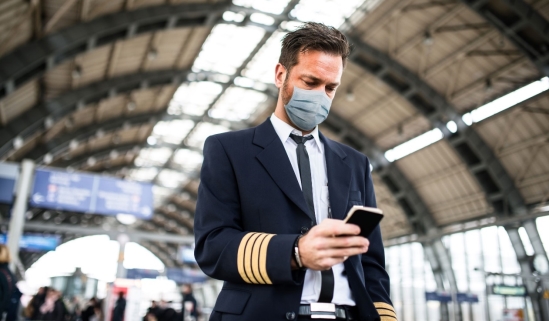SITA, the technology provider for the air transport industry, has developed a proven blockchain-based solution enabling the verification of an electronic personnel license (EPL) without network connectivity. Allowing offline verification in an efficient and privacy-preserving way, SITA’s contribution supports the International Civil Aviation Organization’s (ICAO) adoption of an industry-wide digital standard for the use of EPLs on international flights.
After setting out to create a digital standard for the use of EPLs on international flights, the International Civil Aviation Organization (ICAO) determined that the ability to verify EPLs without network connectivity would be a necessary feature to ensure functionality across civil aviation authorities globally. SITA began to work on a solution to the issue of offline license verification in 2019. Following a successful Proof of Concept in 2020 where SITA integrated its solution for offline verification into the Civil Aviation Authority of China’s EPL system, SITA has become the first industry partner to prove offline verification for pilot licenses, made possible specifically by using blockchain-based decentralized identity technology.
Having a proven example of integrating offline verification capabilities has enabled the ICAO Air Navigation Commission to issue a recommendation to move forward with developing an international standard for EPLs. In March 2022, the ICAO Council will consider adopting a new international Standard that will pave the way for EPLs to become valid licenses, with offline verification systems in place by the end of 2022, citing SITA’s solution as an example.
SITA’s contribution represents one more step towards streamlining the multi-stakeholder processes behind personnel license issuing and verification, while preventing possible fraud and preserving sensitive identity information from privacy concerns. The COVID-19 pandemic has demonstrated a stronger need than ever for digitalization, as office closures meant civil aviation authorities were unable to issue or renew paper-based pilot licenses. Whereas issuing a digital license takes a few days, paper-based licenses may take several weeks, incurring significant costs for operators and public administrations. And the only option for additional verifications of a paper-based license is contacting the issuing Authority, which can lead to operational disruptions and possible flight delays.
However, centralized databases with sensitive information are proven to be vulnerable to breaches and liabilities, and a central data management system is not well-suited to the needs of the complex ecosystem of civil aviation authorities, involving different states and organizations. A blockchain-based solution which eliminates the need for a centralized database and enables offline verification is ideal.
SITA’s solution to bring offline verification capabilities to an EPL system is built based on the Self-Sovereign Identity (SSI) model, using decentralized identity technology which provides users control over their personal data, allowing them to share a trusted credential for verification without revealing personal information. SITA has previously successfully applied decentralized identity to solutions such as the Aruba Health App.
First, the issuing civil aviation authority creates a signed credential gathering information about a pilot license, and issues it to a pilot. The pilot then accepts, stores, and presents a verifiable credential representing the license. The credentials are managed in a digital wallet, in the form of a mobile application which integrates seamlessly with the existing civil aviation authority app. With another mobile application, any inspector can then request, receive, and verify pilot’s licenses by exchanging the credential, with the option to transfer the credential offline using media such as a QR code.
This system provides easy and trustworthy license verification without the time-consuming process of verifying civil aviation authorities’ files by contacting their offices for extra checks. Pilots meanwhile no longer have to worry about losing, misplacing, or damaging physical credentials and benefit from the confidence that their personal data is kept private. The system will also lead to cost efficiencies over time: while it has been designed for use by pilots on international flights, civil aviation authorities will equally be able to leverage their EPL systems for all licensed personnel, maximizing their investment.
Miguel Marin, Chief Operational Safety, ICAO, said: "The COVID-19 pandemic has accelerated digitalization across the air transport industry, but the benefits of adopting a digital standard for electronic personnel licenses will last well into the long term: providing easier, quicker collaboration across civil aviation authorities globally, as well as a solution to fraud and reduced costs over time. We’re grateful for SITA’s willingness, working closely with the Civil Aviation Authority of China (CAAC), to develop a proof of concept to leverage cutting-edge innovation to the benefit of our entire sector."
Sébastien Fabre, CEO, SITA FOR AIRCRAFT, said: "Our collaboration with ICAO on providing offline verification capabilities to EPLs is the latest example of SITA taking advantage of cutting-edge technology to bring greater efficiency to the air transport industry. With its ability to streamline complex multi-stakeholder processes in a secure way, blockchain technology is perfectly adapted to the industry’s needs. We have explored its benefits in the past with industry-first initiatives such as the MRO Blockchain Alliance, and our current partnership with ICAO allows us to apply our expertise on decentralized identity technology to support industry-wide change."
The collaboration on EPLs is part of a newly signed 5-year partnership between ICAO and SITA aimed at supporting the global aviation community through innovations in aviation safety, air navigation capacity and efficiency, and aviation training.




